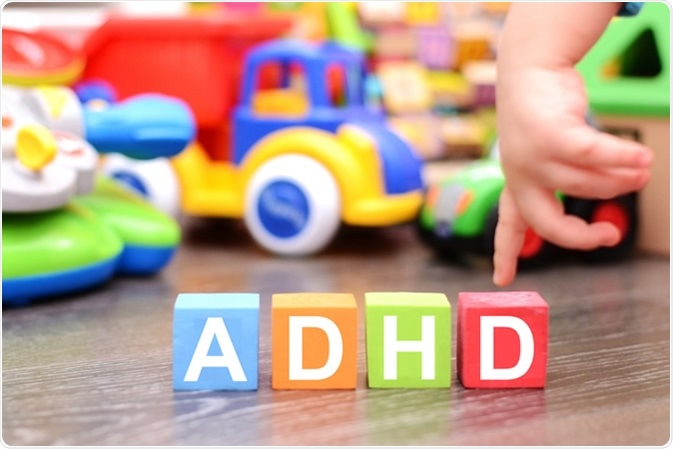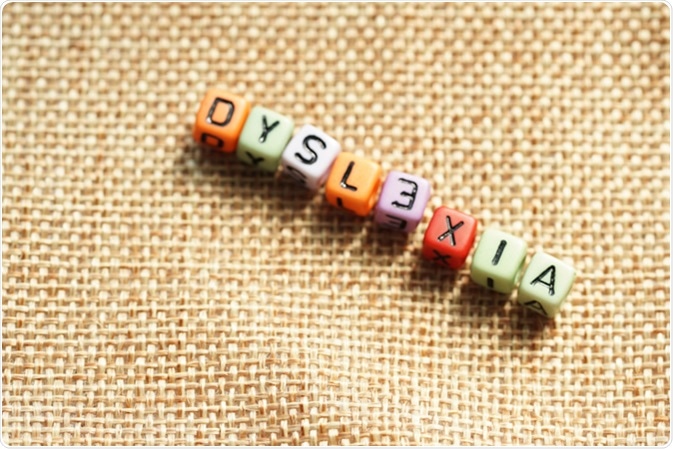Skip to:

Attention Deficit Hyperactivity Disorder or ADHD. Image Credit: Eviart / Shutterstock
What is ADHD?
Attention deficit hyperactivity disorder (ADHD) is one of the most common neurodevelopmental disorders of childhood. The condition is characterized by inattention, impulsivity, and hyperactivity, which can cause significant behavioral, academic, social and cognitive impairments. It is thought that more than 60% of those diagnosed with ADHD will also have at least one other comorbid psychological disorder.
ADHD and Anxiety
What is Anxiety?
Anxiety disorders such as generalized anxiety disorder (GAD) are among the most common psychiatric disorders thought to affect approximately 19% of adults each year in the US. The disorder is characterized by persistent feelings of worry, fear, and a sense of being overwhelmed on a daily basis. What separates an anxiety disorder to general anxiety or worry that people might experience is the fact that those with anxiety disorders worry excessively and unrealistically about everyday occurrences such as health, family, and the future. The excessiveness is typically difficult to control, which can significantly impact the individual’s ability to manage their daily life, and alongside this, many may experience additional physical and psychological symptoms.
Anxiety disorders are thought to affect approximately 32% of adolescents at some point between ages 13 and 18-years. Like many disorders, anxiety may be experienced alongside comorbid disorders such as ADHD.
ADHD and Anxiety
It is argued that those with ADHD may experience anxiety disorders as a result of their ADHD and the impairments and dysfunctions it can cause. Furthermore, research has found that this anxiety can often be experienced in cases of undiagnosed and therefore untreated ADHD. Individuals with comorbid anxiety and ADHD typically develop anxiety at an earlier age, experience more extreme symptoms of anxiety, and substance abuse issues compared to those with just ADHD.
Furthermore, ADHD is often diagnosed significantly later in those with comorbid anxiety compared to those with ADHD alone. This is thought to occur as the anxiety might inhibit impulsivity. Research has suggested that the comorbidity seen between ADHD and anxiety may be due to similarities in neurological deficits. For example, in both disorders, deficits often experienced are associated with executive control and poor prefrontal activity.
Treatment Considerations
It is suggested that treatment should focus on addressing the ADHD symptoms as this may ultimately reduce anxiety, which is often experienced as a by-product.
ADHD, Autism Spectrum Disorder (ASD) and Asperger’s
What is ASD?
ASD is comprised of a set of neurodevelopment disorders which are characterized by deficits in nonverbal interactions, such as facial expressions, body gestures, reduced eye contact, and social behaviors which typically present within the first three years of infancy. The disorder affects males 2-3 times more than females; however, like in ADHD, this may be due to under-recognition of ASD symptoms in females.
Autism, specifically, is a developmental disability which causes differences in how a person interacts with others and perceives their environment. As a spectrum disorder, individuals will experience specific difficulties to varying degrees, which may affect them in different ways.
What is Asperger’s?
Asperger syndrome is categorized as a type of autism spectrum disorder (ASD). Those with the disorder often experience issues with nonverbal communication, social interaction coupled with repetitive and limited interests and behavior. Compared to those with ASD, individuals with Asperger’s are often considered to be at the high functioning end of the spectrum.
ADHD, ASD and Asperger’s
Comorbidity between ADHD and those on the autism spectrum is thought to occur among 14% to 78% of affected persons. Research has highlighted differences in patterns of deficits in top-down processing in children with ADHD and ASD. Typically, children with ASD struggle with cognitive flexibility (the ability to switch tasks or attention readily), and planning, compared to those with ADHD who often face difficulty sustaining attention and inhibition. However, children with ASD and ADHD symptoms often present deficits in inhibition, which is similar to those with ADHD alone. Differences in working memory have also been noted in those with ASD.
Treatment Considerations
Treatment options may need to be adapted in individuals with both ADHD and ASD. Social skills training is often used to treat children with ASD. However, it has been found to have limited effectiveness on managing symptoms in those with ADHD and ASD due to deficits in working memory, delayed recall, and acquisition. This may complicate such interventions as effective social interaction often relies on the ability to take-turns and maintain attentional focus, which requires working memory.
ADHD and Depression
What is Depression?
Depression is a common mood disorder characterized by loss of interest in activities previously found pleasurable and persistent feelings of sadness. There are five main depressive disorders with the most prevalent being major depressive disorder (MDD). Similarities between the disorders include somatic and cognitive changes, sadness, emptiness, and irritable mood that significantly impair the individual’s ability to manage their daily life.
ADHD and Depression
Depression is a common psychological mood disorder which can be chronic for those with the condition, as can be ADHD. A body of research has shown links between both disorders, with approximately 9% to 38% of those with ADHD are also diagnosed with depression. The combination of both conditions can often present challenges to clinicians. Major depressive disorder can often exacerbate the symptoms, and therefore the dysfunctions of ADHD further. Additionally, it is suggested that those who present with MDD at a later stage following their ADHD diagnosis may develop severe dysfunction compared to those with just MDD.
It is suggested that those with ADHD experience demoralization, extreme unhappiness and sad or low mood. Due to the dysfunction they often face, the inability to reach their potential can create a sense of loss or hopelessness often association with MDD. Research including the self-reported feelings of those with ADHD found that those with ADHD and MDD reported a lower quality of life compared to those with just MDD.
Treatment
It is assumed that antidepressants may be beneficial in treating symptoms in those with ADHD and depression as the medication has been found to be effective in treating both conditions in isolation. Furthermore, particular tricyclic and fluoxetine antidepressants have been found to be safe when used alongside stimulants.
ADHD and Dyslexia
What is Dyslexia?
While most consider dyslexia to be characterized predominantly by difficulty with reading, those with the psychological disorder may have deficits in visual processing, working memory, phonology and auditory skills also. Individuals with dyslexia often report issues of seeing the text shifting on pages and having difficulties with the glare given off by white paper. Furthermore, some may show indications of experiencing binocular problems, whereby they miss out lines or words, lose their place often while reading or misread words entirely.

Image Credit: Mohdizuan / Shutterstock
ADHD and Dyslexia.
Impairments in both ADHD and dyslexia can often have a synergistic effect whereby one contributes to the worsening of the other. Therefore, individuals with both disorders may experience more significant deficits in academic performance and cognitive processes.
Treatment
Treatment options should look at addressing both disorders in order to improve optimal levels of performance, especially in school and workplace settings.
Sources
- Munir S., & Takov V. (2019). Anxiety, Generalized Anxiety Disorder (GAD). https://www.ncbi.nlm.nih.gov/books/NBK441870/
- Chand S. P., & Arif H. (2019). Depression. https://www.ncbi.nlm.nih.gov/books/NBK430847/
- Faridi F., & Khosrowabadi R. (2017). Behavioral, Cognitive and Neural Markers of Asperger Syndrome. Basic and Clinical Neuroscience. DOI: 10.18869/nirp.bcn.8.5.349
- Leitner Y. (2014). The Co-Occurrence of Autism and Attention Deficit Hyperactivity Disorder in Children – What Do We Know? Frontiers in Human Neuroscience. DOI: 10.3389/fnhum.2014.00268
- Andersen P. N., Hovik K. T., Skogli E W., et al. (2013). Symptoms of ADHD in Children with High-Functioning Autism Are Related to Impaired Verbal Working Memory and Verbal Delayed Recall. PLOS. DOI: 10.1371/journal.pone.0064842
- Managing ADHD in Children, Adolescents, and adults with comorbid anxiety in primary care (2007). Primary Care Companion to the Journal of Clinical Psychiatry. https://www.ncbi.nlm.nih.gov/pmc/articles/PMC1896299/
- National Autistic Society (2016). Autism. https://www.autism.org.uk/about/what-is/asd.aspx
- Park H. R., Lee J. M., Moon H.E., et al. (2016). A Short Review on the Current Understanding of Autism Spectrum Disorder. Experimental Neurobiology. DOI: 10.5607/en.2016.25.1.1
- Katzman M. A., Bilkey T. S., Chokka P. R., et al. (2017). Adult ADHD and Comorbid Disorders: Clinical Implications of a Dimensional Approach. BMC Psychiatry. DOI: 10.1186/s12888-017-1463-3
- Moody S. (2014). Dyslexia, dyspraxia, and ADHD in adults: what you need to know. British Journal of General Practice. DOI: 10.3399/bjgp14X679859
- Czamara D., Tiesler C. M., Kohlbock G., et al. (2013). Children with ADHD Symptoms Have a Higher Risk for Reading, Spelling and Math Difficulties in the GINIplus and LISAplus Cohort Studies. PLOS. DOI: 10.1371/journal.pone.0063859
- McIntosh D., Kutcher S., Binder C., et al. (2009). Adult ADHD and Comorbid Depression: A consensus-derived diagnostic algorithm for ADHD. Neuropsychiatric Disease and Treatment. https://www.ncbi.nlm.nih.gov/pmc/articles/PMC2695217/
- Turgay A., & Ansari R. (2006). Major Depression with ADHD: In Children and Adolescents. Psychiatry. https://www.ncbi.nlm.nih.gov/pmc/articles/PMC2990565/
Further Reading
Last Updated: Sep 4, 2019